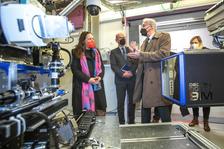Manja Schüle, research minister in Brandenburg learning about a PETRA III beamline from DESY director Helmut Dosch. (Image: DESY, M. Mayer)
Good relations between the Ministry of Science, Research and Culture of the State of Brandenburg and DESY have become even better today. Research minister Dr Manja Schüle visited DESY in Hamburg today, having already paid visits to the DESY campus in Zeuthen to learn about DESY's research. On Friday 8 April she met with the DESY Directorate for an exchange on research topics and went on a tour of the research facilities and pioneering projects.
The Minister was particularly interested in the research DESY and its campus partners are doing on the coronavirus, its decoding and possible active substances. After an exchange with the DESY Directorate, the campus tour therefore took her to the Centre for Structural Systems Biology CSSB and the PETRA III accelerator, where important measurements on possible corona agents have been made.
"Impressive work is being done at DESY in Hamburg!" says Schüle. "Thanks to the unique analytical possibilities, for example with the X-ray radiation source PETRA III, researchers here are gaining important insights extremely quickly. These insights can be used for practical applications, such as in the development of new medicines. Only extraordinary analytical tools like PETRA III create the necessary basis that scientific progress needs - which in turn leads to groundbreaking research achievements. With its locations in Hamburg and Zeuthen in Brandenburg, DESY is one of the world's leading centres for research on and with particle accelerators. It shapes the future with outstanding science and research!"
At the end of her tour, the Minister visited the Start-up Labs Bahrenfeld, DESY's joint project with the University and the City of Hamburg for start-ups from research with a physical or biophysical focus.
"We are very happy to make visits like this possible. Seeing the research facilities with your own eyes and feeling the atmosphere on campus gives a very different impression of the science that we do," said Helmut Dosch, Chairman of the DESY Directorate. "Our discussions on national research infrastructures will also further deepen the good cooperation between the ministry and DESY."
Manja Schüle has become a familiar face at DESY. She made her inaugural visit to Zeuthen in Brandenburg in September to find out about research, the history of the centre, the people and the young technical and scientific talent there. On her tour with Christian Stegmann, DESY Director for Astroparticle Physics and Head of the Zeuthen site, she was so fascinated that she spontaneously stayed longer than planned.
In March, Manja Schüle laid the foundation stone for the scientific data centre of the international gamma-ray observatory Cherenkov Telescope Array Observatory CTAO in Zeuthen together with Volkmar Dietz, Head of the Sub-Division Large Facilities and Basic Research at the Federal Ministry of Education and Research, Federico Ferrini, the Managing Director of CTAO GmbH, and DESY Director Helmut Dosch. Against the backdrop of the Ukraine war, she emphasised that she was convinced that science and research will continue to bring people together in the future. "I am sure: the new Science Data Management Centre will be a jewel of Brandenburg's
research landscape - and build new bridges."
The Future Investment Fund of the State of Brandenburg is also supporting a new centre for quantum technology applications in Zeuthen, the Centre for Quantum Technology Applications, CQTA, with a funding amount of 12.8 million euros for five years.
(from DESY News)







